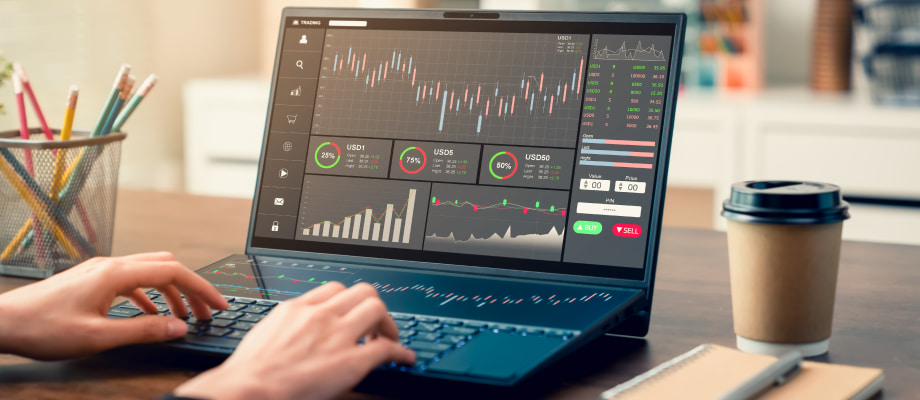Online brokers in the UK have varying features that cater to different traders’ needs. One such powerful feature is Direct Market Access (DMA), which has gained considerable popularity in the financial markets over the years. DMA enables traders to connect directly with exchanges and liquidity providers, offering a host of advantages and opportunities.
Traders who have been trying to explore the DMA feature in the financial space should read this comprehensive guide. Not only will you understand what DMA is, but also its uses, benefits, and impact on trading strategies.
In This Article
What is Direct Market Access (DMA)? Uses and Benefits
What is DMA?

DMA (Direct Market Access) is a trading mechanism that enables market participants to access financial markets directly without the need for intermediaries. It allows traders to send buy and sell orders directly to the exchange or liquidity provider, granting them more control over the execution of their trades. DMA is commonly used in electronic trading and continues to become popular due to its efficiency and flexibility.
Who Uses Direct Market Access?
Various types of market participants, including institutional investors, hedge funds, proprietary trading firms, and individual traders, widely use Direct Market Access. Institutional investors utilise DMA to execute large trades with minimal market impact, while hedge funds and proprietary trading firms leverage DMA to implement their trading strategies swiftly and efficiently. Even individual traders can access DMA through brokerage firms that offer direct market access services.
Overall, DMA trading platforms are primarily recommended to professional traders or investors. This is because the accounts can be challenging to operate compared to regular brokers’ platforms. For instance, algorithmic trading that comes with DMA requires professionals who are well-versed in the trading method for increased profit potential.
That being said, beginner traders or investors looking to explore the DMA feature should consider practising its operations using a broker’s demo account before investing real money.
Explore in our other guide Best Algorithmic Trading Platform.
DMA Service Technology
DMA service technology encompasses the infrastructure and software systems that facilitate direct market access. It involves the use of electronic trading platforms and connectivity solutions that enable traders to route their orders directly to the market. These platforms often provide real-time market data, advanced order types, and risk management tools to enhance the trading experience.
DMA service technology may also include low-latency connections, co-location services, and smart order routing algorithms to optimise trade execution.
Advantages and Disadvantages of Direct Market Access
While DMA has plenty of benefits for investors, it also falls short in specific categories. Below, we explore some of the pros and cons of DMA so you can fully understand what to expect and make the best decision.
Pros
- Faster Order Execution: DMA allows traders to bypass intermediaries and send their orders directly to the market. This direct connection enables faster order execution, as trades are executed without delays caused by brokerages or other intermediaries. In fast-paced and highly liquid markets, speed can be a critical factor in securing advantageous prices and reducing slippage.
- Greater Control: DMA grants traders more control over their orders. Traders can specify the exact price, quantity, and order type they desire, ensuring precise trade execution according to their trading strategies. This level of control allows traders to implement complex trading strategies and customise their approach to fit their specific needs and preferences.
- Access to Deeper Liquidity: DMA provides traders access to a broader pool of liquidity by connecting them directly to exchanges, liquidity providers, and other market participants. This increased access to liquidity can result in improved trade execution, especially when executing large orders that might otherwise face challenges with slippage or limited market depth.
- Potentially Lower Costs: DMA can lead to cost savings compared to trading through traditional brokers. By bypassing intermediaries /brokers, traders can avoid brokerage commissions and potentially access better pricing on trades. Additionally, DMA allows traders to utilise advanced order types, such as limit orders or iceberg orders, which can help minimise trading costs and enhance trade execution efficiency.
Cons
- Higher Complexity: DMA requires a higher level of trading knowledge and expertise compared to traditional retail trading. Traders utilising DMA must have a solid understanding of market structures, order types, and risk management. Managing direct market access effectively demands a certain level of experience and familiarity with the intricacies of the financial markets.
- Additional Costs: While DMA can potentially lead to cost savings, it may also come with additional costs. Traders may be subject to market data fees, connectivity charges, and access fees imposed by exchanges or liquidity providers. These costs can add up, particularly for frequent traders or those accessing multiple markets.
- Market Risk Exposure: DMA exposes traders directly to market risks without the protection or guidance of an intermediary. Traders bear the responsibility of monitoring market conditions, managing order execution, and handling potential execution errors. Direct exposure to rapid price fluctuations and market volatility can pose challenges and increase the risk of losses if not managed effectively.
Direct Market Access vs Retail Trading (Non-DMA Trading)
Direct Market Access differs from retail trading, also known as non-DMA trading, in several aspects. In retail trading, individual traders typically execute their trades through a brokerage firm that acts as a middleman between the trader and the market. The broker aggregates client orders and executes them on the trader’s behalf. This method often offers simplicity and convenience, as brokers handle trade execution and provide additional services such as research and customer support.
On the other hand, DMA provides traders with direct access to the market, allowing them to interact with exchanges or liquidity providers directly. This access direct software connection bypasses the need for intermediaries and offers advantages such as faster execution, greater control, and potentially lower costs. DMA is more commonly used by institutional and professional traders who require advanced trading capabilities and direct market participation.
Unfortunately, only a few DMA brokers in the UK. Therefore, ensure you conduct thorough market research and comparisons to identify one with convenient features. Take advantage of brokers’ demo accounts to familiarise yourself with the DMA platform before deciding whether to use it in your activities.
DMA Example
One example of Direct Market Access (DMA) in action is through Contracts for Difference (CFD) trading. CFDs allow traders to speculate on the price movements of various financial instruments without owning the underlying asset. DMA CFD trading offers traders direct access to the market, allowing them to interact with the order books of exchanges and access real-time market data. Let’s describe a hypothetical scenario illustrating how DMA works in CFD trading.
Suppose you want to trade shares via DMA trading platforms. Here’s how the process might unfold.
- Search for the Best Price: On a broker’s DMA platform, search for the best available price to buy or sell the underlying asset, which in this case, is shares. The platform provides real-time market data, including bid and ask prices, order book depth, and trade volumes. This information allows you to assess market conditions and identify favourable trading opportunities.
- Place an Order: Once you have identified the desired price level, you will place an order directly through the platform. The order specifies the number of shares you want to buy or sell and the price at which you wish to execute the trade. The order is then transmitted to the market for execution.
Note that DMA CFD trading may come with risks, considering that CFD trading involves the application of leverage. To avoid risking losing a lot of money, it is crucial to be mindful of the potential for market volatility. Plus, always apply risk management controls in your activities and understand the requirements for direct access for maximum potential.
FAQs
DSA (Direct Strategy Access) refers to direct access to pre-defined trading strategies or algorithms. It allows traders to automate their trading activities based on specific conditions or market data. In contrast, DMA (Direct Market Access) is the direct connectivity between traders and the market. It enables traders to bypass intermediaries and trade directly with exchanges or liquidity providers for faster order execution and increased control.
A market maker is an individual or financial institution that provides liquidity by quoting both buy and sell prices for a financial instrument. Market makers facilitate trading by always being willing to buy or sell at the quoted prices. On the other hand, DMA allows traders to access the market directly, bypassing market makers and executing trades at the best available prices.
DMA in forex refers to Direct Market Access in the foreign exchange market. It enables traders to trade currencies directly with liquidity providers, including banks and other financial institutions, without the need for intermediaries. DMA in forex allows traders to access a deeper liquidity pool and potentially obtain better pricing for their currency trades.
Conclusion
Direct Market Access (DMA) is a powerful trading service that provides traders with direct access to financial markets. It offers numerous benefits, including faster order execution, greater trade control, and access to deeper liquidity. While DMA requires advanced trading knowledge and carries additional risks, it has become an essential tool for institutional investors, hedge funds, proprietary trading firms, and individual traders seeking efficient and transparent trading experiences. By leveraging DMA, market participants can enhance their trading strategies, execute trades more efficiently, and capitalise on market opportunities with greater agility.





